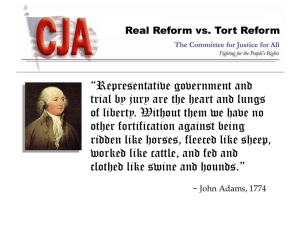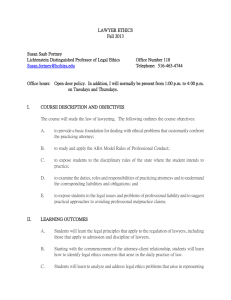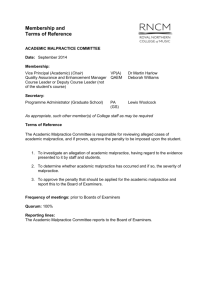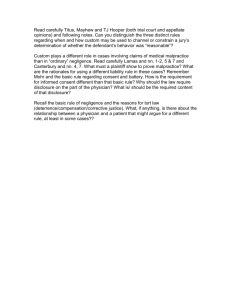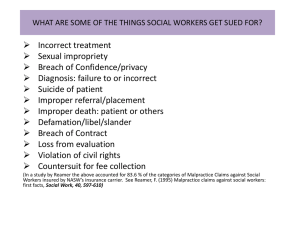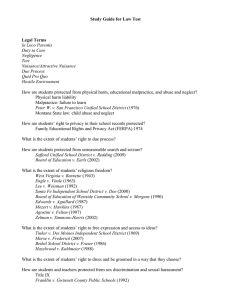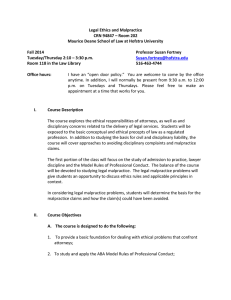Document 14120230
advertisement
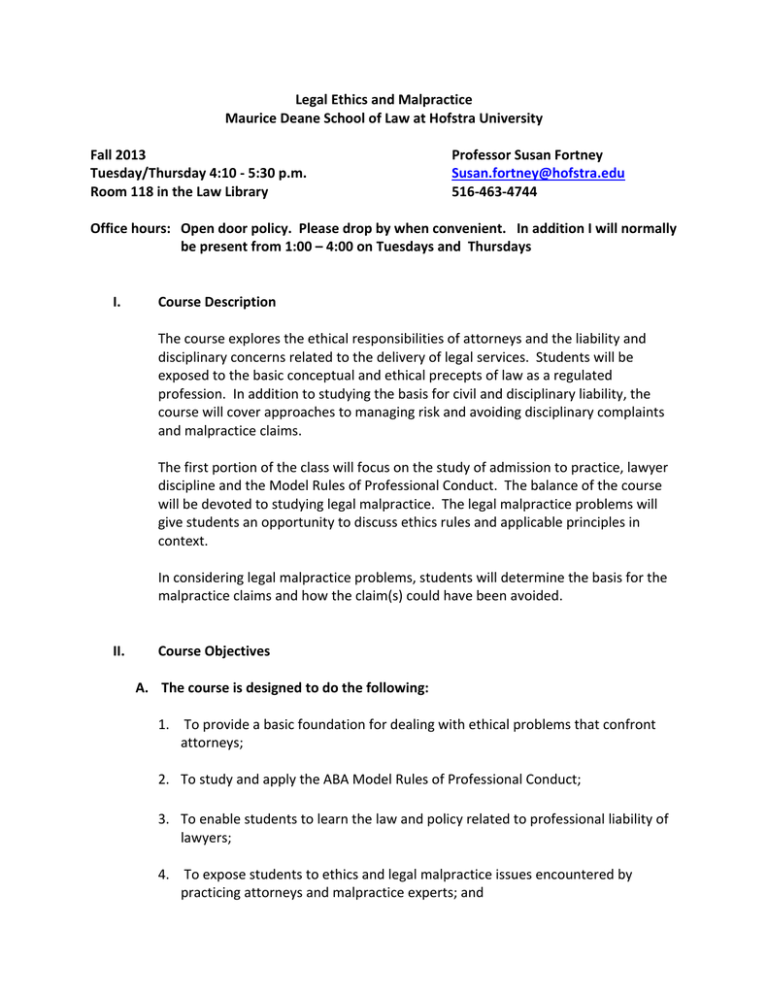
Legal Ethics and Malpractice Maurice Deane School of Law at Hofstra University Fall 2013 Professor Susan Fortney Tuesday/Thursday 4:10 -­‐ 5:30 p.m. Susan.fortney@hofstra.edu Room 118 in the Law Library 516-­‐463-­‐4744 Office hours: Open door policy. Please drop by when convenient. In addition I will normally be present from 1:00 – 4:00 on Tuesdays and Thursdays I. Course Description The course explores the ethical responsibilities of attorneys and the liability and disciplinary concerns related to the delivery of legal services. Students will be exposed to the basic conceptual and ethical precepts of law as a regulated profession. In addition to studying the basis for civil and disciplinary liability, the course will cover approaches to managing risk and avoiding disciplinary complaints and malpractice claims. The first portion of the class will focus on the study of admission to practice, lawyer discipline and the Model Rules of Professional Conduct. The balance of the course will be devoted to studying legal malpractice. The legal malpractice problems will give students an opportunity to discuss ethics rules and applicable principles in context. In considering legal malpractice problems, students will determine the basis for the malpractice claims and how the claim(s) could have been avoided. II. Course Objectives A. The course is designed to do the following: 1. To provide a basic foundation for dealing with ethical problems that confront attorneys; 2. To study and apply the ABA Model Rules of Professional Conduct; 3. To enable students to learn the law and policy related to professional liability of lawyers; 4. To expose students to ethics and legal malpractice issues encountered by practicing attorneys and malpractice experts; and 5. To enable students to identify and prevent common problems that result in disciplinary complaints or malpractice claims. B. Learning outcomes 1. Students will learn to apply ethics rules and legal principles that apply to the regulation of lawyers. 2. Students will learn how to identify legal ethics concerns that arise in representing clients, dealing with non-­‐clients, and serving as an officer of the tribunal. 3. Students will learn substantive legal principles that apply to legal malpractice claims and defenses. 4. Students will learn procedural aspects of prosecuting and defending legal malpractice claims. 5. Students will learn how to avoid legal ethics problems, disciplinary complaints, and malpractice traps. III. Course Format The class will combine lecture and discussion. Interactive questions will enable students to apply the Model Rules and applicable law. Class discussion will focus on the problems presented in the Text and in class. Problems (many of which are based on actual cases and controversies) will give students an opportunity to apply legal principles and recommendations included in the reading. IV. Reading and Resources A. Required Readings Susan Saab Fortney and Vincent R. Johnson, LEGAL MALPRACTICE LAW: PROBLEMS AND PREVENTION (Thomson West 2008) (Text) American Law Institute, A CONCISE RESTATEMENT OF THE LAW GOVERNING LAWYERS (2007) (compiled by Susan Saab Fortney and Vincent R. Johnson) (Restatement) Note: Rather than buying the CONCISE RESTATEMENT, you can read the assigned Restatement provisions on WESTLAW (REST-­‐LGOL) or LEXIS. ABA Model Rules of Professional Conduct (any professional responsibility supplement dated 2012 or later). PLEASE BRING YOUR RULES TO EACH CLASS. Note: Rather than purchasing a book, you can access the assigned rules on-­‐line or through WESTLAW OR LEXIS. V. B. Supplemental Resources LEGAL MALPRACTICE LAW (West Nutshell Series) by Vincent R. Johnson LEGAL MALPRACTICE (2012 ed.) by Ronal Mallen and Jeffrey Smith (5 volumes on reserve) THE LAW OF LAWYERING by Hazard and Hodes RESTATEMENT (THIRD) OF THE LAW GOVERNING LAWYERS (American Law Institute) For additional sources, see Basic Guide for Researching Legal Malpractice and the Hofstra Law Library Guide for Research Legal Ethics and Professional Responsibility for Lawyers posted on TWEN. Class schedule and assigned readings For a list of readings, please see the Course Schedule distributed and posted on TWEN. When the reading assignment refers to a section from the Restatement or a Model Rules, please read the black letter provision and the comments. VI. Course Requirements and Evaluation A. Class Participation (15%) Attendance and class participation are required. Five absences are permitted. If you miss six classes, your grade will be lowered one step. If you miss seven classes, you must withdraw from the course. Attendance is taken at the beginning of class. Promptness is required. If you are late, you are encouraged to join the class, but will be counted absent for the day. Once you are in class, the expectation is that you stay in class unless there is an emergency. Because there will be a break, students are asked not to disrupt the class by coming and going out of the classroom. Use of laptops, cell phones, and other electronic devices are prohibited during class. If you use such a devise during class you will earn no points for class participation and are subject to other available discipline. In many classes, students will use responder units to answer questions. Because individual units are assigned to students, the answers to questions can be monitored. Although you are encouraged to volunteer, you are subject to being called on during class. Failure to be prepared will affect your class participation grade. If you prefer not to be called on for a particular class, you should advise Professor Fortney in writing, before class commences, that you would like to take a “pass.” You are allowed two passes during the semester. B. Closed Book Examination (85%) The final examination will be a combination of multiple choice questions and essay questions. The multiple choice portion of the examination will largely be based on the Model Rules and the law of lawyering studied in class. The essay portion of the examination will focus on legal malpractice issues. Before the final examination, students will take a practice examination.
